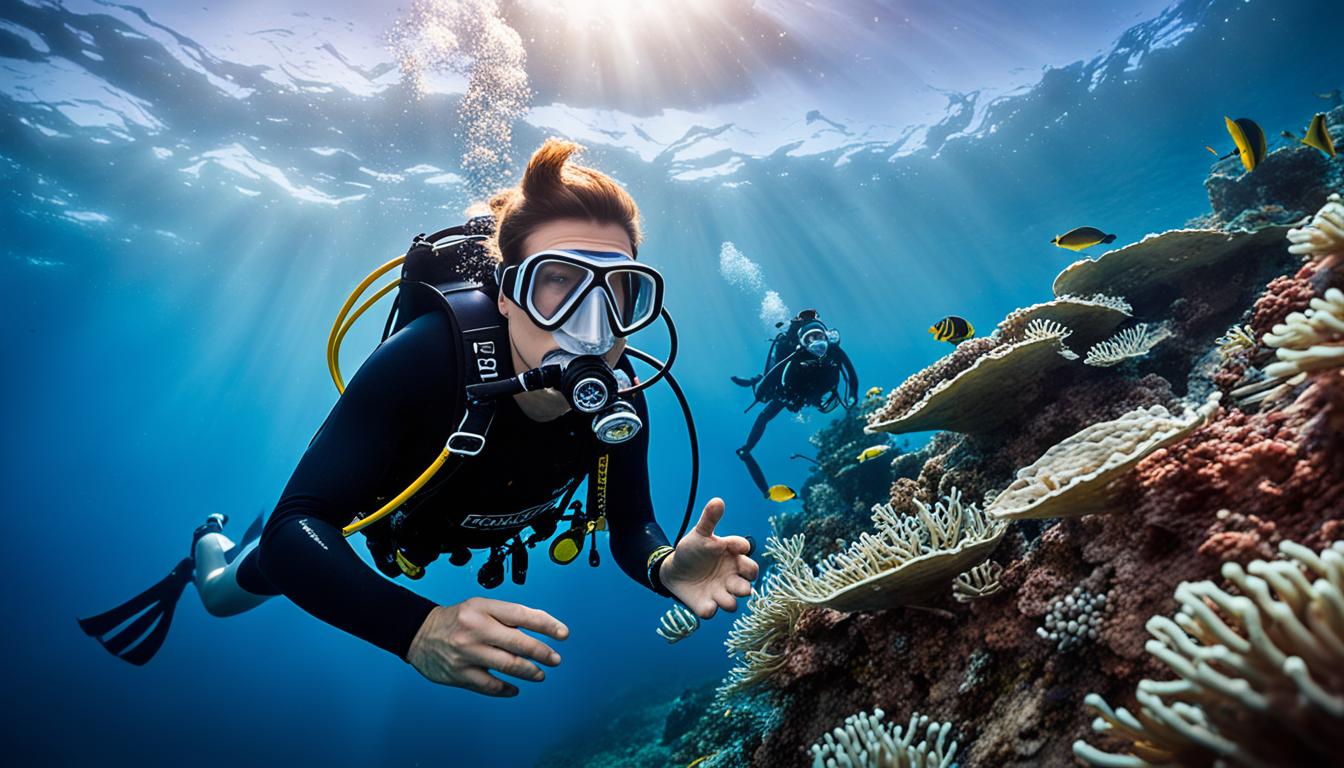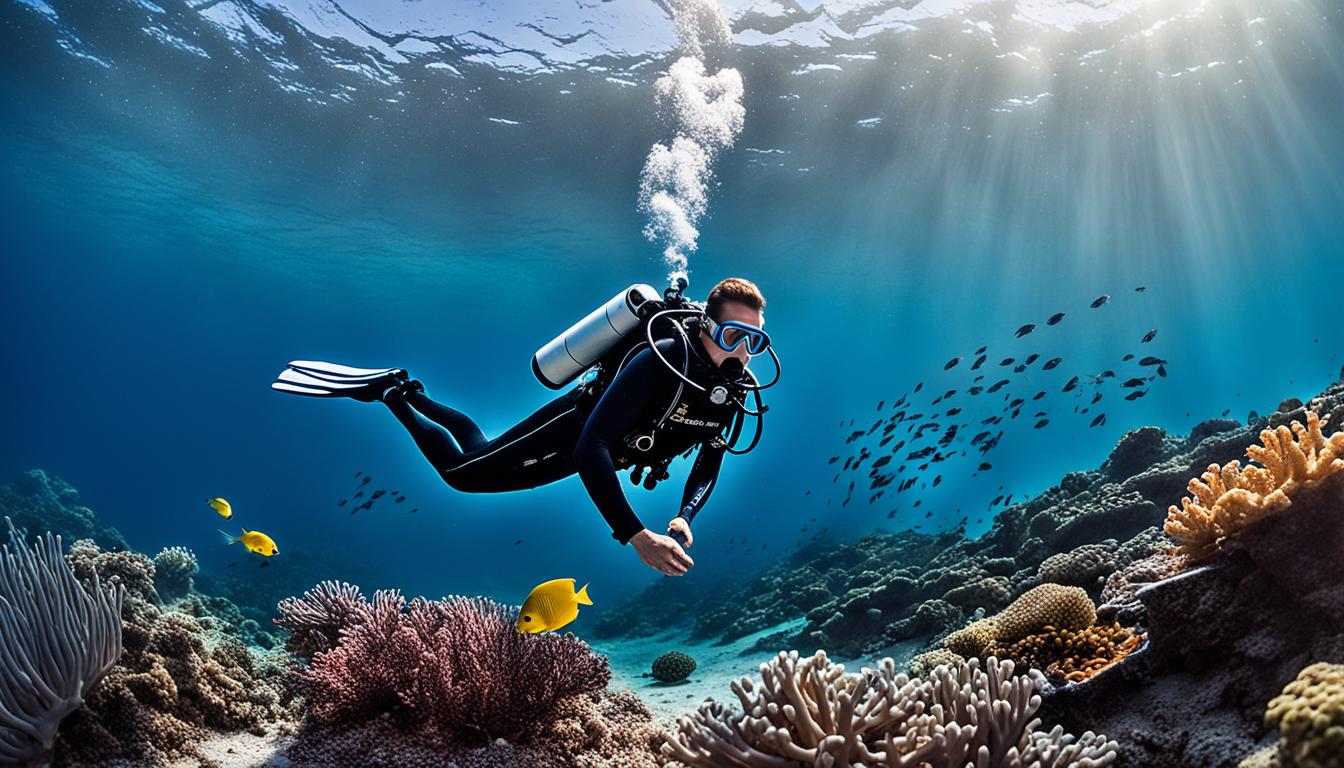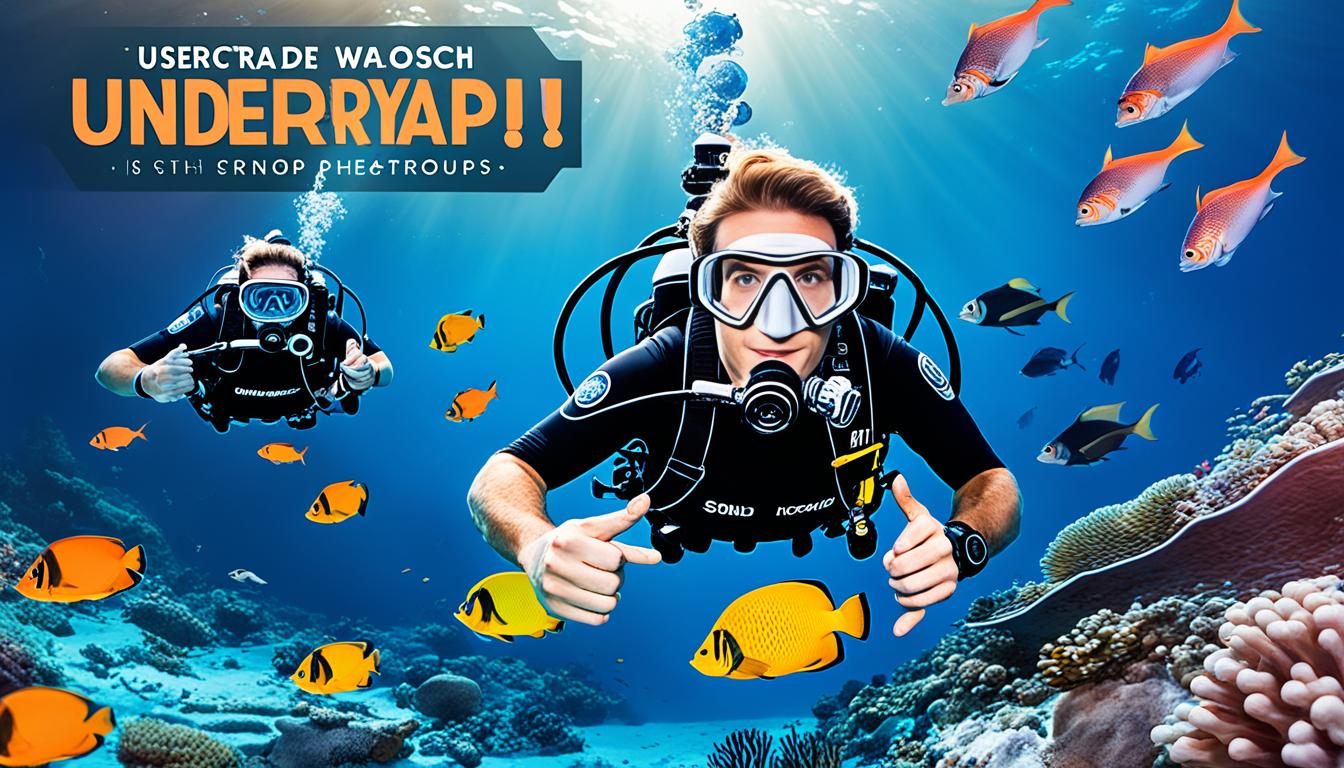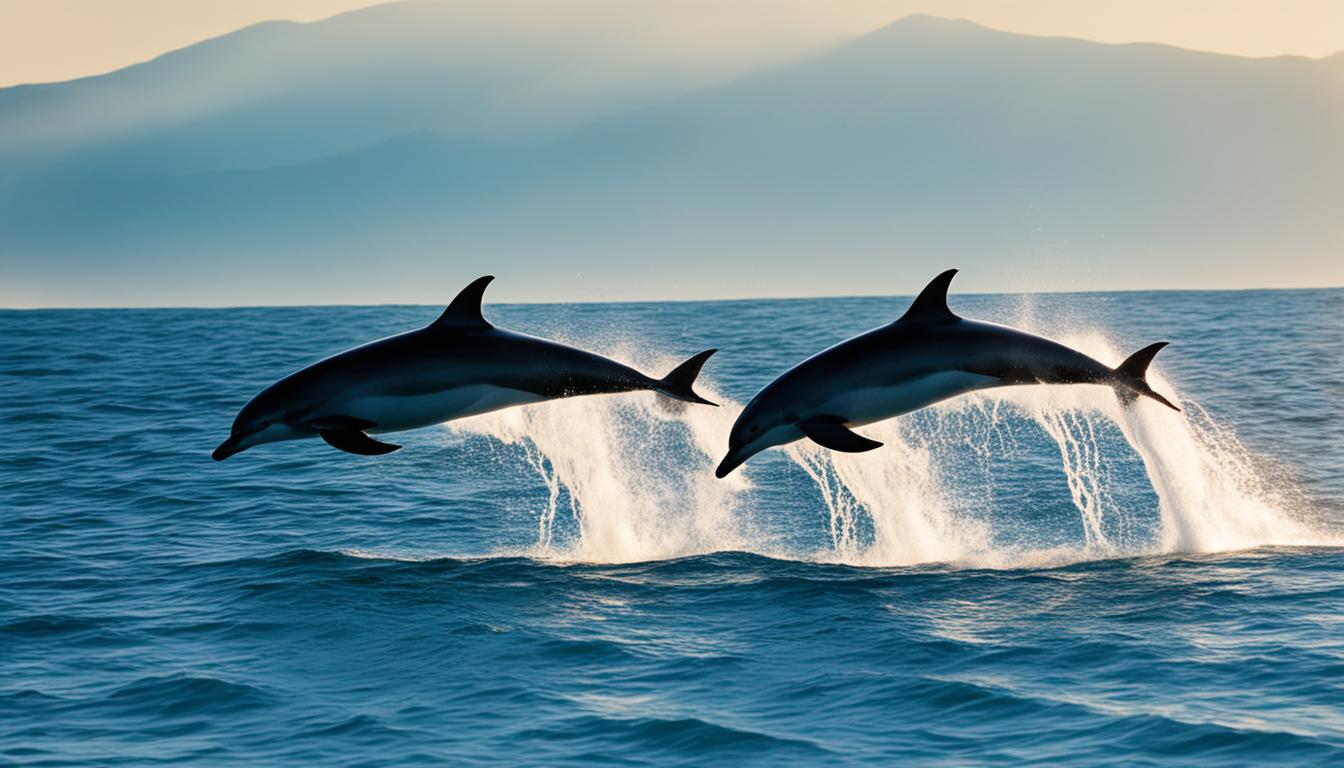Greetings fellow underwater photographers! Are you ready to take your skills to the next level and capture breathtaking images of marine life? In this article, we will delve into the world of advanced diving techniques for photographers, offering valuable tips and guidance to help you achieve mastery in professional diving photography.
Underwater photography presents unique challenges, but with the right techniques and practice, you can create stunning images that showcase the beauty beneath the waves. From mastering scuba diving camera techniques to understanding the best settings for capturing marine life, we’ll cover it all.
So grab your scuba gear, prepare your camera, and immerse yourself in the world of advanced diving techniques for photographers. Let’s dive in!
Key Takeaways:
- Deliberate practice is essential for mastering advanced diving techniques for photographers.
- Expert instruction can significantly accelerate your skill development in underwater photography.
- Investing sufficient time and effort is vital to achieving mastery in professional diving photography.
- Understanding scuba diving camera techniques and settings is crucial for capturing stunning marine life images.
- Undertaking the Master Diver certification program can enhance your knowledge and skills in advanced diving techniques.
What is Deliberate Practice?
Deliberate practice is an approach to skill development that focuses on deliberate and focused efforts to improve performance. It involves identifying specific areas of improvement, breaking down weaknesses into clearly defined goals, setting challenging goals, seeking honest feedback from experts, and investing enough time in practice. In the context of advanced diving techniques for photographers, deliberate practice can involve improving advanced underwater photography skills, mastering the use of dive photography equipment, and enhancing composition and lighting techniques.
The Importance of Expert Instruction
To achieve mastery in advanced diving techniques for photographers, we understand the vital role of expert instruction. At this stage, receiving guidance from knowledgeable and experienced instructors is crucial. They possess the expertise to guide divers through the deliberate practice process and provide valuable feedback and guidance. With their guidance, divers can unlock their full potential and elevate their underwater photography skills to new heights.
Expert instructors go beyond the basics and delve into advanced underwater composition techniques. Through their instruction, photographers can learn how to capture the perfect shot by understanding the best photography settings for diving. They offer insights, tips, and tricks that can make a significant difference in capturing stunning images underwater.
Investing in expert instruction not only accelerates the learning process but also reduces the time needed to become an expert diver and photographer. These instructors provide personalized guidance, constructive feedback, and the necessary tools to develop advanced diving skills. With their expertise, photographers can master the art of expert underwater composition and utilize the best photography settings for diving, producing captivating and visually stunning images of the underwater world.
The Role of Deliberate Practice in Skill Development
Deliberate practice is essential for divers who want to develop advanced skills and excel in underwater photography. By engaging in deliberate practice, we can focus on specific areas of improvement, such as underwater lighting techniques and capturing captivating images of marine life. This type of practice allows us to break down complex diving scenarios into manageable steps, set challenging goals, and receive expert feedback to continuously improve our performance.
During deliberate practice sessions, we can experiment with different lighting techniques, understanding how to effectively use natural light or artificial lighting equipment underwater. By mastering these techniques, we can bring out the vibrant colors and intricate details of marine life in our images.
In addition to lighting techniques, deliberate practice helps us refine our composition skills to create visually compelling and balanced photographs. We can learn to position ourselves and our subjects in a way that creates a sense of depth and captures the beauty and dynamics of the underwater environment.
By practicing deliberately, divers can develop the necessary skills to master the art of underwater photography. Through consistent effort and a focus on improvement, we can capture breathtaking images that showcase the wonders of the marine world.
Deliberate practice is not about mindlessly going through the motions. It’s about conscious effort, setting goals, and pushing ourselves to reach new levels of skill and creativity. By dedicating time and energy to deliberate practice, we can unlock our full potential as underwater photographers.
Benefits of Deliberate Practice in Skill Development
- Improved underwater lighting techniques
- Enhanced composition skills
- Increased creativity and innovation in capturing marine life images
- Greater confidence and control in challenging diving situations
- Ability to adapt to changing underwater conditions

| Underwater Lighting Techniques | Capturing Marine Life Images |
|---|---|
| Experiment with natural light | Positioning and framing subjects |
| Use artificial lighting equipment | Creating depth and perspective |
| Understanding light absorption and diffusion | Highlighting unique details and textures |
The Time Commitment for Mastery
Achieving mastery in advanced diving techniques for photographers requires a significant time commitment. According to Malcolm Gladwell, it takes an average of 10,000 hours of effective practice to achieve true mastery and expertise. While this figure may vary for each individual, it serves as a guideline for the level of dedication needed.
Divers should allocate sufficient time for deliberate practice, including practicing with dive photography equipment, working on expert underwater composition, and refining their skills through consistent and focused practice.
The Importance of Time
The path to mastery in advanced diving techniques for photographers is not an easy one. It demands time and dedication to hone your skills and become proficient in capturing breathtaking underwater images. It’s not just about taking a few snapshots; it’s about understanding the technical aspects of dive photography equipment, mastering expert underwater composition, and practicing until these skills become second nature.
Effective underwater photographers recognize that investing time and effort into deliberate practice is vital for growth and improvement. This deliberate practice involves dedicating focused hours to perfecting your craft, pushing yourself to experiment with different techniques, and seeking feedback from experts in the field.
By dedicating time to hone your skills with dive photography equipment and develop expert underwater composition, you’ll not only become a better photographer but also gain a deeper appreciation for the beauty and wonders of the underwater world.
We must remember that Rome wasn’t built in a day. Mastery takes time, effort, and patience. It’s a journey that requires consistent practice and a genuine passion for the art of dive photography.
The Dive Photography Equipment Advantage
When it comes to mastering underwater photography, having the right equipment is crucial. Investing in high-quality dive photography equipment can greatly enhance the quality of your images and help you capture exceptional shots.
Dive camera brands like Nikon, Canon, and Sony offer a wide range of cameras specifically designed for underwater photography. These cameras are built to withstand the challenges of the underwater environment and deliver stunning image quality.
| Dive Camera Equipment | Features |
|---|---|
| Nikon D850 | High-resolution images, exceptional autofocus, and rugged build for underwater use. |
| Canon EOS 5D Mark IV | Full-frame sensor, high ISO performance, and excellent autofocus for capturing detailed underwater scenes. |
| Sony Alpha a7R IV | Mirrorless design, high-resolution sensor, and advanced image stabilization for sharp underwater images. |
Pairing these advanced cameras with underwater housings, strobes, and lenses designed for underwater photography allows you to unleash your creativity and capture stunning images that truly showcase the underwater world.
As you invest time in practicing with your dive photography equipment, you’ll become more familiar with its capabilities and optimize its settings to suit different diving conditions. This familiarity and proficiency will dramatically improve your underwater photography skills and enable you to capture breathtaking images of marine life.
Dedicating time to mastering dive photography equipment and developing expert underwater composition is a key step towards becoming a skilled photographer in the underwater realm.
Traits of Expert Diving Instructors
Expert diving instructors are essential for mastering advanced diving techniques and capturing stunning marine life images. These instructors possess specific traits that set them apart:
- Coaching and mentoring teaching style: Expert instructors use a personalized approach to guide divers, providing individualized guidance and constructive feedback.
- Qualifications and expertise above the level they teach: These instructors have in-depth knowledge and experience in diving beyond what they teach, ensuring they can offer comprehensive instruction.
- Regular practice of their own skillset: Expert instructors continue to refine their own diving and photography skills, staying up-to-date with the latest scuba diving camera techniques and trends.
- Commitment to researching and applying emerging techniques: These instructors are dedicated to exploring new scuba diving camera techniques and innovative ways to capture captivating marine life images.
Divers seeking mastery should actively seek out instructors with these traits to receive the best guidance and support. With the help of expert instructors, photographers can develop their skills and reach new heights in their underwater photography journey.
Testimonial:
“Thanks to my instructor, Sarah, I’ve learned invaluable scuba diving camera techniques that have transformed my underwater photography. Her personalized coaching style and commitment to staying updated with emerging trends have truly elevated my skills.”
– John Thompson, Advanced Diver
Expert Diving Instructors Comparison Table:
| Instructor Name | Coaching Style | Qualifications and Expertise | Commitment to Research |
|---|---|---|---|
| Lisa Johnson | Personalized and supportive | Master Scuba Diver Trainer certification, 10+ years of experience | Regularly attends industry conferences and workshops |
| Mark Rodriguez | Structured and goal-oriented | Course Director certification, extensive deep diving expertise | Conducts research on underwater lighting techniques |
| Emily Roberts | Interactive and hands-on | Underwater Naturalist specialty instructor, marine biology background | Keeps up with emerging scuba diving camera techniques |
These expert instructors excel in their coaching styles, possess extensive qualifications and expertise, and actively research and apply new techniques. They are dedicated to helping divers master scuba diving camera techniques and capture breathtaking marine life images.

The Path to Mastery – Master Diver Certification
Are you ready to take your diving skills to the next level? Look no further than the Master Diver certification, the pinnacle of non-leadership diving certification. This sought-after certification program, offered by DIPNDIVE, is specifically designed for advanced divers like you who are eager to expand their diving knowledge and skills.
The Master Diver certification consists of six comprehensive modules. Each module covers different aspects of diving, providing an in-depth exploration of essential diving techniques and knowledge. Let’s dive into what each module entails:
| Module | Focus Area |
|---|---|
| Responsible Diving | Learn responsible diving practices and environmental conservation techniques. |
| Equipment Operation | Master the operation and maintenance of dive equipment to ensure safe and optimal performance. |
| Shipwreck Diving | Explore the fascinating world of shipwreck diving and learn the techniques involved. |
| Diving Environment | Gain a deeper understanding of the underwater environment and its unique challenges. |
| Search and Recovery | Develop essential skills for locating and recovering lost objects underwater. |
| Deep and Simulated Decompression Diving | Expand your diving horizons by mastering deep diving and simulated decompression techniques. |
Each module consists of a combination of interactive classroom seminars and thrilling open water activities. This comprehensive approach ensures that you not only gain theoretical knowledge but also have hands-on experience to refine your diving skills.
Throughout the Master Diver certification program, you’ll have the opportunity to focus on scuba diving camera techniques, capturing mesmerizing images of marine life, and honing your skills in professional diving photography. The program aims to equip you with the expertise needed to excel in these specialized areas of diving.
So, if you’re ready to embark on the path to mastery, the Master Diver certification is your gateway to becoming an exceptional diving photographer. Sign up for this prestigious program offered by DIPNDIVE and unlock your full potential as a master diver.
Conclusion
Achieving mastery in advanced diving techniques for photographers requires deliberate practice, expert instruction, and a significant time commitment. With dedicated effort, photographers can enhance their underwater photography skills, learn scuba diving camera techniques, and capture stunning images of marine life.
Deliberate practice allows divers to focus on specific skills and continuously improve their performance. By setting challenging goals, breaking down complex scenarios, and receiving expert feedback, divers can develop the necessary expertise to excel in underwater photography.
Expert instructors play a crucial role in guiding divers through the deliberate practice process. Their knowledge and experience are vital in teaching advanced underwater composition techniques, sharing the best photography settings for diving, and offering insights and tips for capturing breathtaking images underwater.
By dedicating sufficient time to deliberate practice and mastering advanced diving techniques, photographers can unlock their full potential and achieve the highest level of professionalism in underwater photography. With perseverance and dedication, the path to mastery in advanced diving techniques for photographers is within reach.
FAQ
What are some advanced diving techniques for photographers to master?
Advanced diving techniques for photographers include underwater lighting techniques, expert underwater composition, and mastering the use of dive photography equipment.
What is deliberate practice?
Deliberate practice is an approach to skill development that involves focused efforts to improve performance and includes specific goals, seeking feedback, and investing enough time in practice.
How important is expert instruction in mastering advanced diving techniques for photographers?
Expert instruction is crucial in mastering advanced diving techniques as it provides valuable feedback, guidance, and teaches skills such as underwater composition and the best photography settings for diving.
How does deliberate practice play a role in skill development?
Deliberate practice allows divers to focus on improving specific skills, such as underwater lighting techniques and capturing compelling images of marine life, by breaking down complex scenarios into manageable steps and receiving expert feedback.
How much time commitment is required to achieve mastery in advanced diving techniques?
While the exact time may vary, it generally takes a significant time commitment, with an average of 10,000 hours, to achieve mastery in advanced diving techniques. This includes practicing with dive photography equipment and refining skills through consistent and focused practice.
What traits should expert diving instructors possess?
Expert diving instructors should have a coaching and mentoring teaching style, qualifications and expertise in diving, regular practice of their own skillset, and a commitment to researching and applying emerging scuba diving camera techniques and capturing marine life images.
What is the Master Diver certification?
The Master Diver certification is the highest non-leadership level of diving certification, designed for advanced divers who want to expand their diving knowledge and skills. It covers various aspects of diving, including scuba diving camera techniques, capturing marine life images, and professional diving photography.
How can I achieve mastery in advanced diving techniques for photographers?
To achieve mastery, you should engage in deliberate practice, seek expert instruction, and dedicate a significant amount of time to practice and refine your skills. With perseverance and dedication, mastery in advanced diving techniques for photographers is within reach.
-Are the Advanced Diving Techniques for Photographers Helpful for Underwater Videography?
Yes, advanced diving techniques for photographers are definitely helpful for underwater videography. The proper use of underwater videography essentials gear, such as stabilizers and underwater lighting, combined with advanced diving skills, can greatly improve the quality of underwater videos.




